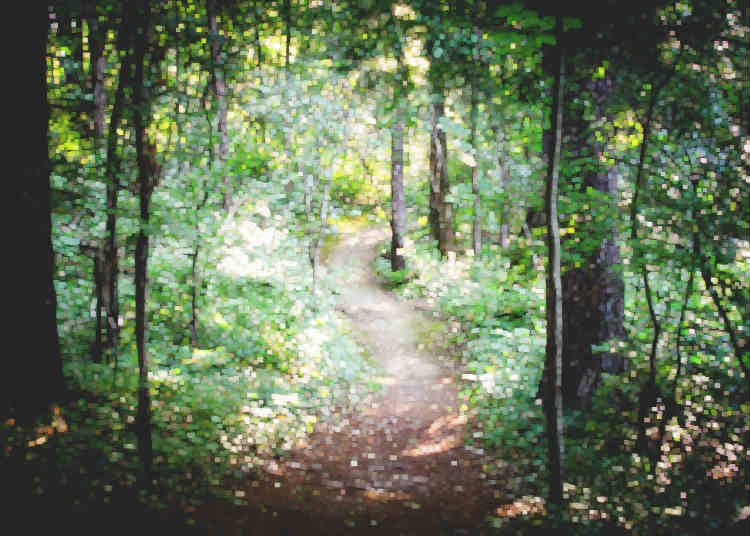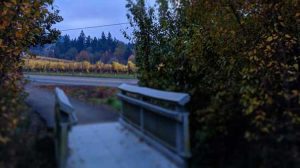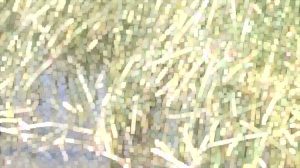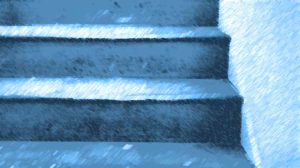
Mud hardens on my combat boots as I step behind my sister through the sickle of woods dividing her property from her neighbors. The son of the previous owners, born intellectually disabled and fond of motors, rode a four-wheeler across this pathway several times a day. Since he moved with his parents to Tampa for their retirement, however, the path has atrophied. It has invited an incursion of wildness that makes our walk with my 4-year-old nephew into a form of preservation, into the equivalent of our feet carving a ghost river where rain has not yet fallen.
My nephew brandishes a sword, a stick he has found along the driveway. Yet he fails to use it to clear any branches that might snag my sweater into an unraveling. He has watched “Sleeping Beauty” the evening before and called himself Prince Philip all morning but practices no chivalry. Allowing me to pass before her, my sister does that for him. She holds each barbed branch straying across where I am walking.
She wants pigs here by summer, she tells me. Pigs will forage for edible roots and rotting fruit wreathing trees’ bases. Pigs will trample smaller trees that keep more desirable species from thriving. Through their hunger, pigs will foster a higher canopy. They will clear brush without knowing.
A trained psychologist now a stay-at-home mother of two young children, my sister has taken to extrapolating interpersonal meaning from agroforestry, to seeing human application in the biodiversity she’s cultivating on these 20 acres she has already populated with chickens, guinea fowl, and bees. By letting pigs express their pigness, she says widening her eyes at me, the ecosystem reaps advantage. The forest thins into balance. The topsoil thickens and suffers less erosion, she stresses, when my nephew turns and stabs me.
I turn to face him, and he grimaces as if he were the one who had been stabbed rather than the one who had done the stabbing. He grimaces because he has tried to pierce my finger but has missed his target. He has tried to prick it the same as the spinning wheel did that of Sleeping Beauty but has hit my coccyx. He has penetrated only a knot of nerve endings, distributing pain all throughout my body.
Still, he orders me to fall asleep on what he insists is my 16th birthday. He says this in spite of knowing I’m closer in age to Maleficent, the evil witch consumed with sexual jealousy. I yawn for appearances’ sake then add I’ll wait to sleep until this evening. In response, he twirls his distaff through a veil of spider webs hanging from a fig tree. He falls among its roots’ surfacing weave, a young beauty only pretending to be dying.
My sister shrugs and says recreating scenes from movies is part of his pigness, though a faze more than likely. I laugh and brush burrs from my sleeve as her golden retriever runs its paws across me, seeking the love I am withholding. The dog has gone blind in one eye since my last visit. Clouds have occluded her left iris, a result of her breed’s purity, my sister says when I ask the reason. The price for being so golden.
At a coffee shop late next morning as my nephew finishes his school day, my sister voices her concern with the soil quality of the small farm we have inherited from our parents, whose land we rent to farmers sowing corn and soybeans. She worries about its mineral depletion from pesticides and chemical fertilizers as well as tilling. That no new crops are ever planted prevents the soil’s microorganisms from being replenished. Each year, yet more are ravaged.
After her baby begins to cry and my sister feeds her beneath a blanket, she confides that yesterday she stopped her car near our old driveway. She walked to the field bordering the road and ran its soil through her fingers, yet no worms filtered through them. Worms aerate soil as well as enrich it with nutrients through defecation, she reminds me. I drink more coffee pretending this doesn’t turn my stomach, this truth that is the food chain’s basis.
The farmer who rents the majority of our acreage has leveled tens of trees for easier mowing without asking our permission, she also mentions. He has flattened a landscape already long flattened by the tread of mastodons and spread of glaciers in former centuries into a place dry and lifeless. For the pleasure of looking out onto blankness, he has killed the last remnants of a deciduous forest. My sister says I’d hardly recognize what lies within only half an hour’s driving distance but I express no interest in passing. Its pastures as long bereft of livestock as we are of our parents, there are now no plants left except those grown for profit. All the corn harvested is shipped to Asia, where it awaits its conversion into fructose corn syrup.
Stirring more cream in my coffee that spirals into its own wan galaxy, I tell my sister and niece if she listens that lavender lining fields’ edges buffers against insect damage. I have remembered this from an ecology class in college, yet am aware even as I say it I do so only to smell the lavender as I speak, because sensing the beauty of what is absent may be my pigness. Because we both know that convincing these farmers to plant lavender in place of spraying pesticides is hopeless.
As she hands her baby to me to hold for a moment, to absorb her warmth and smoothness, another baby beside us takes notice. I turn my niece to face him, allowing her to study the baby boy’s gestures of longing and affection. She pulls her left sock off instead, refusing to wave back at him. She communicates her indifference while possessing a beauty my sister thinks will make her rebellious as an adolescent, an assessment borne of our shared assumption that too much beauty spoils the beauty’s object.
That I would prefer being spoiled for beauty I was not born with and my sister accepts what’s given may be the main difference between us. Cradling my niece’s powdered softness, I long to inhabit her newness. I long to be reborn alluring to rotten.
Still, I can see the advantage of pigs that look repulsive. Still, I know their wide, flat noses help them forage for food hidden beneath the earth’s epidermis. Through their nostrils’ islands of darkness, pigs detect the lavender that lies wild and dormant, the purple abundance that was never planted. My niece struggles from my arms once my coffee’s galaxy becomes clouded, its once white stars blurring into brownness.
Tending to the growth of her animals, plants, and children allows my sister to express her pigness, she confesses as we drive back to her home again, confessing this as if I don’t know this. I’m glad I’m visiting here in February rather than spring, I can’t help reflecting as she continues talking. I’m glad only because soil with worms wriggling through it scrapes away at my bright blue nail polish that matches a tea set I’ve bought only for appearances. To tea, though, I have always preferred coffee, which stains my teeth the color of dirt already.
Halfway between my sister’s home and the one we grew up in lies the grave of a Native American, a warrior chief hailing from a tribe now nameless because their slaughter too has been forgotten. His resting place divides the road in half, making separate lanes for the length of a chieftain of what is ever only one in rural places. I ask my sister if it still exists, this mound that to me has always resembled a vulva but whose woman has sunken. Of course, she says. It’s not as if you can move it. The grave is sacred for a reason to which no plaque bears witness. Along this slim asphalt strip, it has remained a fertile island regardless. Someone still takes time to mow grass looking more verdant than that flanking the road on either side of it.
Raindrops don’t mimic tears in shape, I mention as my sister pours me a glass of wine she has bought especially for my visit. It’s a fact I have encountered at random but have remembered now with relish. In place of eating any dinner, my nephew is dipping his paintbrush in a vase half filled with roses. With his watercolors he depicts rain falling onto houses while singing a song that resembles an incantation in a vaguely Slavic language. He sings softly to himself then instructs me to repeat his lyrics.
When I try to sing with him, however, I misunderstand them. I try singing nonsense to please him but can never manage. Gradually he sings louder to compensate for the poor hearing he diagnoses. He tells me that I’m going deaf, when my sister silences him. She asks me why raindrops differ from water falling from the faucet, and I say air pressure makes them taper at their bottoms. Each droplet falling from the sky resembles a man jumping from a plane with his parachute open.
My sister slices the shepherd’s pie whose crust she makes from yeast she keeps in a jar on her counter, yeast she feeds flour and water so its growth is endless. She carves the pie into squares and suggests we require those farmers renting our acreage to rotate their crops in next year’s leases. To this they’ll likely prove resistant, yet the practice will enrich the soil’s nitrogen. We can also mandate them not to till, which contributes to erosion, allowing rain falling in the shape of skydiving men to wash the soil’s microorganisms into river basins.
She hands me my plate and admits she’s more concerned with the earth’s longevity since having children. I thank her and unfold my napkin, feeling thankful once again for being childless. Silently I utter my thanks to heavens I know are godless while seeing little chance for this planet. Each day, more paratroopers dive to save what they imagine are mermaids beneath them, making this world yet more aqueous. Leaving the skies to make love to half-fish, half-women, they drown instead among a species they find less attractive.
Rather than fearing the end, I await the smothering of these men contained in every water droplet. Smelling their aftershave while eating shepherd’s pie I find delicious, I can taste the soil that has nurtured the mushrooms and peas that fill it. Onions resembling worms drained of pigment I leave on my plate unfinished.
While my brother-in-law washes dishes and my sister fills the compost bin with our dinner’s remnants, I tear paper from my nephew’s notebook and begin painting beside him. I paint blue parachutes falling from a cloud so orange fire rather than water seems to fill it. Pointing to the water droplets, I tell him these are men come to rescue us, men so tiny I can hardly see their faces yet I know are handsome. My nephew says my painting is beautiful, a rare compliment. He leaves his own work aside to watch my hand hover above the paper, to study what mine does that his cannot accomplish. He stops singing gibberish, points to the skydiving men, and whispers, “The water wakes up,” when I nod for confirmation. He gasps, amazed that I have heard him.
I grab and kiss him on his forehead where he has grown two extra noses, I tell him while also pretending to squeeze them. Since he was a baby, I have said he has a marshmallow in place of a nose with any hardness, and where there is one marshmallow I want there to be two or three or seven. Only this draws his eyebrows closer together in irritation, this nonsense he has not invented. When my sister examines our artwork and unties her apron, I squeeze her nose and make a sound like a bell being rung with a mallet. She laughs, annoyed at my old trick from the time we were children, saying I have always had a thing with noses. I have always squeezed their cartilage.
She looks out the window toward her garden and sighs there is rain on the horizon. She repeats this when I tell her there isn’t. For all my lack of farming sense, for all my urbanness, I can always smell when rain is imminent, the falling water that renders topsoil a region of loss too often. This though I used to sit for hours watching television holding my nose in an attempt to reshape its pugness into something more pointed, something whose sense of smell as a result is blunted. My nostrils are as wide as a pig’s, I used to complain to my sister again and again, whose nose isn’t much different. With hers, however, she has never had a problem.
Seven years before this visit, three years before my sister began having children, I put marshmallows up my nose once I found them on the counter of the cabin we and our husbands rented for a Fourth of July weekend. I ripped open the bag and stuffed one up each nostril for no other reason than to better smell their sweetness. At the time we were 28 and 26, but my sister followed as if we still were children. Then after they tossed their backpacks on the carpet, my brother-in-law and husband filled their own longer, larger snouts with the marshmallows’ whiteness, until we had none left over to melt into powdered hot chocolate, splayed around the toaster in slim paper packets.
Leaving the cabin’s kitchen, I rummaged through CDs piled between two couches and played a Klezmer album. I started dancing while my mouth hung open. Because left in such a situation, the body knows nothing except it must maintain its rhythm. Plug one or two orifices and the others only open wider to allow more oxygen to enter your system.
When I remind my sister of this next morning at breakfast, she mentions she and her husband have planted Althaea officinalis, the marshmallow plant, on the perimeter of their forest. She laughs and says she can’t believe we once all shoved marshmallows up our noses while serving me fried eggs with bacon. I eat the eggs and daub the bacon with a napkin. She notices what I have not tasted and tells me not to waste it.
Sipping tea she has made from sassafras harvested from her herb garden, I say I’ve seen several movies with banquets in which the pig sits on a long table with its mouth open. The mouth is always filled with an apple the pig would choke on were it still living, and I have grown slightly short of breath when eating bacon since. Its smell too has always made me keep my distance, the smell of something whose frying makes it seem as if it is dying rather than dead already, something dead as well as ugly. Were Sleeping Beauty only more porcine looking, Prince Philip would never have kissed her to begin with. She would have grown old doing nothing except falling more deeply unconscious.
Kneading dough she will later make into pizza to bake in her earth oven, my sister tells me by summer there will be much more bacon in her freezer. The pigs will mate with each other, and she’ll have to butcher a certain percentage. She’ll have to confine the pigs that remain somehow, however. Any saplings, any plants tender as Althaea officinalis emerging from the earth’s supplest layer, will require protection from their hunger.
What are marshmallows’ pigness? I wonder but never bother asking my sister, if only because I know the answer. Let free to fulfill their nature, marshmallows become a marshmallow forest. Yet they can do this only if the forest remains out of balance, if the pigs are pinned and live only a half existence.
Though late February, today is warm as May. Ice patches in the garden have liquefied into an early irrigation. The sun is warming the oceans, and my sister rakes leaves, still desiccating from autumn, with no shoes on. Meanwhile, I refill and empty the same paper cup with water from a pitcher to entertain her baby, who sits beside me on a deck my sister is preparing to varnish. I do this while noticing the pitcher has too thin a neck for its mouth, which never closes. Were it a bird, the neck never could support such a smooth, ceramic beak and bulbous body.
I sprinkle water on my niece’s arms with my fingers, telling her she is now a mermaid. She doesn’t understand me, however. I know because she keeps her legs spread wide for balance rather than splaying only her feet for the fins they can be. My sister shouts that she’s a water baby, when her daughter begins to clap her palms without touching together her fingers. I nod, though if she loves water more than the average, this has escaped me, in part because she does not drink the water I pour her. She does not realize by turning her into a mermaid what I have done for her, the ability even now to start over, to live all her life underwater. To live among men who have escaped the heavens in parachutes to save her.
When my sister and brother-in-law bought this property and my husband and I made our first visit, the three of them swam in the pond beside which beehives now sit sentient. My brother-in-law and husband left their shirts on the grasses while my sister dove fully clothed into the water’s greenness, where her hair became smooth as an otter’s. She shrieked and asked if snakes were swimming with them, when my brother-in-law yelped back, affirming. She shrieked again but stayed sculling then floated on her back, telling me the risk of snakes was worth it.
From the deck, I stood and watched their shining faces. Because I am a land baby, however, I walked back into the sliver of trees whose path was already receding. Leaving the water’s reflective brightness, I exercised my pigness before I knew pigs liked trees to begin with. I left the sun for what I still hope may become the world’s first marshmallow forest, a place whose usefulness goes unnoticed.
Marshmallow plants efflorescence with pale and purple flowers, yet it is their roots that ancient Egyptians once harvested and sweetened with honey. Grinding their pulp into an elixir, they treated sore throats and other common ailments with what is no longer used as medicine. Applied to the skin as a poultice, the plant’s roots and leaves can still, though, soothe burning or abscess. Their smell, my sister tells me, is delicate.

Althaea officinalis derives its name from the Greek word for healing. Yet you have to pull the plant from its soil’s nutrients and squeeze it dry of juices to discover these properties. You have to merge the plant’s root system with the human body, which perhaps early civilizations did more easily, as they wore less clothing. Not for centuries later did French chefs begin mixing meringue with the plant’s pith. It wasn’t until marshmallows evolved beyond the plants that birthed them, until nothing botanical was left, that we could recognize what you now find in bags in every kitchen.
Looking toward my niece laughing at the pitcher I make fly like a breakable bird above her, my sister tells me to come walk barefoot in the grass. It’s something I never get to do living in a city, she muses. I tuck my socks inside my boots, run indoors, and place them beside what was once my parents’ dresser. I do not trust the half-blind golden retriever to resist chewing their rubber.
Walking barefoot on the earth helps the body to absorb negative ions released from deep inside the planet, my sister mentions. The soil’s electric charges neutralize positive radiation leached from electronics. This contact with the top layer of the earth, she says, is the closest we can come to allowing pigs to bring us into balance.
In response to the earth’s goodness, however, I go suddenly frozen. I feign paralysis. My sister asks what is it? I laugh and say that, standing this planted, I can feel my toenails lengthen. I can feel them lunging for the chthonic root nexus of newborn trees below them. I close my eyes for the rain that will wash away all the topsoil into the ocean.
My sister turns over a mound of brown leaves to reveal the worms beneath them, and I add the change is nearly as dramatic as growing from a girl into a woman. Reaching toward the earth’s dark uterus, I await my trampling by pigs let loose in the forest. I’m only doing the same as so many women chased by Zeus back when the earth was more verdant, when metamorphosis of women into plants occurred fairly often. Only here there is no threat of me being ravished.
My sister ignores my histrionics as her baby begins to cry, as I have left her too long alone with the bird pitcher. Of course, this is really my pigness, I tell her, pretending to engage in another incarnation before this lifetime has ended, becoming too curious about inhabiting another body than the one I’ve been given. Then I run and spin my niece around like the wings of a helicopter, hoping she smells the fresh scent I emanate of pale, purple flowers.
At dinner the last evening I will see my sister for several months to come, again my nephew is painting. He sings the same seeming Slavic incantation and asks me once more to sing with him. Instead of shouting when I mispronounce words that still have no meaning, he comes close to my face and whispers what sounds the same as when he was singing loudly. Then he tells me he is drawing raindrops like I have done, raindrops with little men inside them. In the sky, he says, the men are sleeping. When they fall from their clouds, though, they awaken. It why he draws them all with their eyes wide open.
We sit in the dining room as my sister and brother-in-law prepare the salad in the kitchen and my niece sleeps on a sheepskin. I lean in close to my nephew and tell him I have a secret when he leans in more closely so I can whisper back to him. If he closes his eyes and thinks of the ground now begun to soften, he can smell its sweetness. With his two extra noses, I say, he can smell the marshmallows my sister has planted on the forest’s edges. Then I tell him that beneath us lies the real heaven. I tap the side of the nose directly above his mouth to see if it rings like a bell being struck with a mallet, and he shouts at me to stop it.
Five days after leaving and returning to the city, I walk inside a spiritual center a friend has recommended. I come here only because my spirit has begun to feel weighted with dirt so lifeless it has no worms crawling through it. Emerging from a rainstorm into an old high school gymnasium, I browse the crystals and beaded jewelry without wanting to buy any. Confronting a portrait of the goddess Kali, who brandishes a sword and severed head, I hold tight to my umbrella. I do this only because the water has awakened. Because though the men in every droplet may be handsome, they wreak destruction.
No one else here carries a rain jacket, and there is no umbrella stand at the entrance. Yet I continue walking, the only one half wet, and smile at a landscape artist. Asking my name, he takes my hand then holds it close against his stomach. Saying I feel cold to him, he rubs my palm hard and fast, trying to force fire from friction, a campfire on which I fix my gaze rather than looking either into his face or that of an angry goddess.
Music begins, and the crowd convenes as naturally as planets in orbit, rotating around the room’s central emptiness. Dancers wave their arms like sea anemones as the sitarist starts strumming, and I set my purse in a corner but keep my umbrella in hand. Were the ceiling to splinter and leak the rain whose falling is its own melody, everyone here would begin to bathe publicly, I cannot help thinking. I alone would stand protected, outside them.
Yet for the moment, I dance as if I belong here. I clap behind my back with syncopation. I spin when I pass before the projector so my silhouette flashes against slides of a solar system whose stars contain pellucid irises looking half blinded. The music ends and we are told to find a partner. An older man approaches. He takes the lead when we are asked to mirror each other’s movements. He mimics me dancing with the closed umbrella he reaches for but I will not hand him.
I follow a group of women wearing loose sarongs upstairs in my own dress’ constriction, into a room labeled healing. Inside, the healers are men of indeterminate sexuality, either bald or balding, and none blink as they are speaking. I decide I do not want my chakras aligned or adjusted and leave for a room in which a gong sits beside an unlit fireplace. Pillows are piled inside a circle where a crowd is lying looking half dreaming. Rather than sit, I stay standing when a woman sounds the gong and asks us to begin feeling the living presence inside our bodies. I close my eyes for a few minutes, trying to feel a river of life running through me.
I cross my legs and bow my head but cannot help noticing a man with ashen hair who circles the temples of another man beside him. Raising my hands to my own head, I imitate him as if my hands belonged to another person, and the gong sounds again. Another man lying barefoot beneath me says he has transcended this dimension.
He opens green eyes that look to have algae swimming through them, and I think he is too beautiful to know anything of ugliness. Beauty alone must be his pigness. Transcendence of body, I think while still staring down at him, is for those of us with fat, squat noses, those of us who use them to smell plants yet to grow beneath us.
I wake next morning from a long dream of the Native American whose grave divides the road into the shape of the vulva. I dream I have died and he has taken me down to his heaven, because all life leads to a swallowing at its finish. Because the earth only grows hungrier as its fertility diminishes.
As we descend deeper into the soil’s darkness, my guide begins stroking my arm and the river deltas of my inner wrists. He runs his hand down my back, down to where my body divides itself in half at my buttocks. He is going to ravish me, I become conscious. There is no one here to turn me into a plant to stop him.
He reaches for me through soil through which we both still manage to breathe. We are alive while buried. Roots hang above me but offer no healing, and the man is old and ugly. Worms crawl through my nostrils in place of marshmallows amid this loveless love we are now making, when he tells me I am beautiful as a young mermaid, when he cups my breasts with hands that are bones only. Even in heaven, I am waiting for the rain to smooth the topsoil away into something fluid. Even in heaven, I wait for the handsome men with their parachutes open to rescue me. Even planted in soil too deep not to grow into one of the taller trees in the forest, I await the flooding.





Leave a Reply